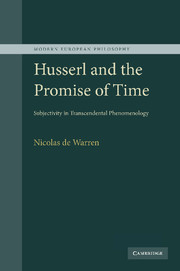Book contents
- Frontmatter
- Contents
- Acknowledgments
- List of abbreviations
- Introduction: the promise of time: subjectivity in Husserl's transcendental phenomenology
- 1 The ritual of clarification
- 2 A rehearsal of difficulties
- 3 The ghosts of Brentano
- 4 The retention of time past
- 5 The impossible puzzle
- 6 The lives of Others
- 7 The life of consciousness
- Appendix: note on textual sources
- Bibliography
- Index
Introduction: the promise of time: subjectivity in Husserl's transcendental phenomenology
Published online by Cambridge University Press: 20 January 2010
- Frontmatter
- Contents
- Acknowledgments
- List of abbreviations
- Introduction: the promise of time: subjectivity in Husserl's transcendental phenomenology
- 1 The ritual of clarification
- 2 A rehearsal of difficulties
- 3 The ghosts of Brentano
- 4 The retention of time past
- 5 The impossible puzzle
- 6 The lives of Others
- 7 The life of consciousness
- Appendix: note on textual sources
- Bibliography
- Index
Summary
There are times when I entertain the thought that Edmund Husserl's life possessed a secret affinity with Raymond Queneau's fictional character Valentin Brû. In Le Dimanche de la vie, Private Brû spends his afternoons tracking the hands of a clock, working hard to keep his mind “clear of the pictures that everyday life deposits in it” in an effort to think, with his eyes open, of nothing. Yet, Monsieur Brû's effort to catch sight of time repeatedly fails, as he is hopelessly distracted by events taking shape in time: “clusters of commonplace words go crackling through a wasteland of automatic movements or of colorless objects.” Brû's gaze continually falls short of time: “for the moment, he doesn't notice anything at all. He stares at a branch, or a pebble, but he loses sight of time. Time has pushed the hand on ten minutes farther and Valentin hasn't caught it at it. And since the branch and the pebble, nothing has happened.” Time stares him in the face, yet occurs behind his back, catching him by surprise; he is too late for time's passage, always failing to see time on time.
I imagine Husserl also spending his afternoons in the pursuit of time, waiting to catch time in the act. But Husserl did not watch time in the Sunday of Life. In the fall of 1917 and spring of 1918, Husserl, with one son dead and the second grievously wounded in the war to end all wars, vacationed twice in Bernau (Germany) to pursue his phenomenological analysis of the constitution of time, “the most difficult of all problems confronting the human mind” (Hua XXIV, 255).
- Type
- Chapter
- Information
- Husserl and the Promise of TimeSubjectivity in Transcendental Phenomenology, pp. 1 - 9Publisher: Cambridge University PressPrint publication year: 2009



